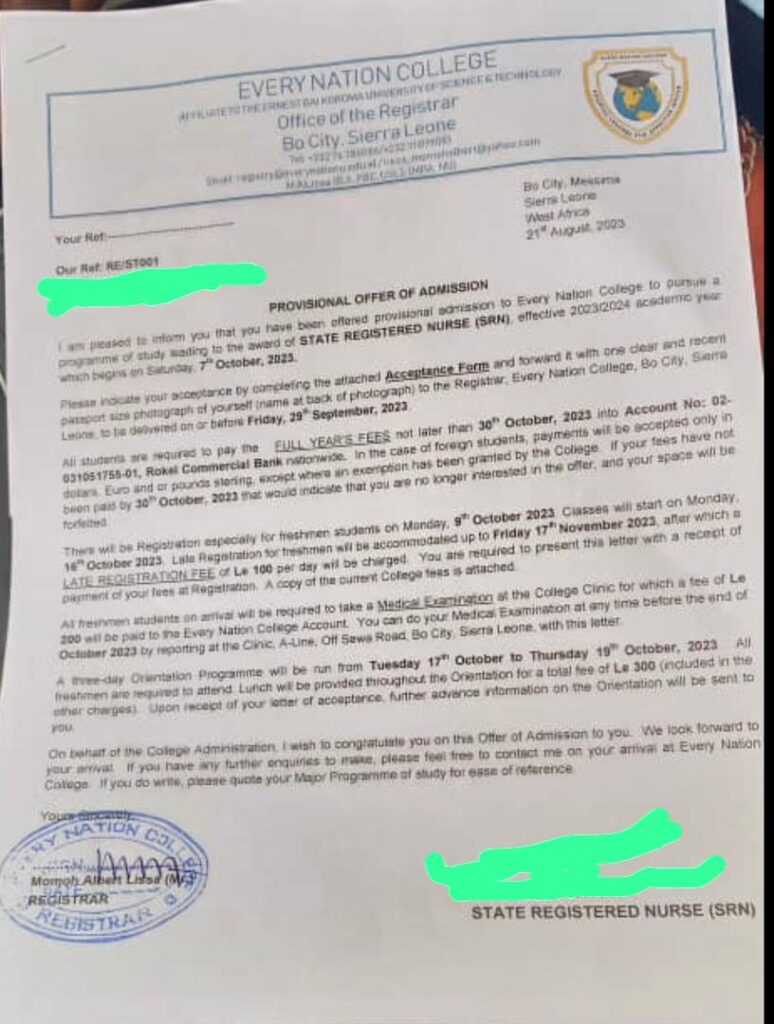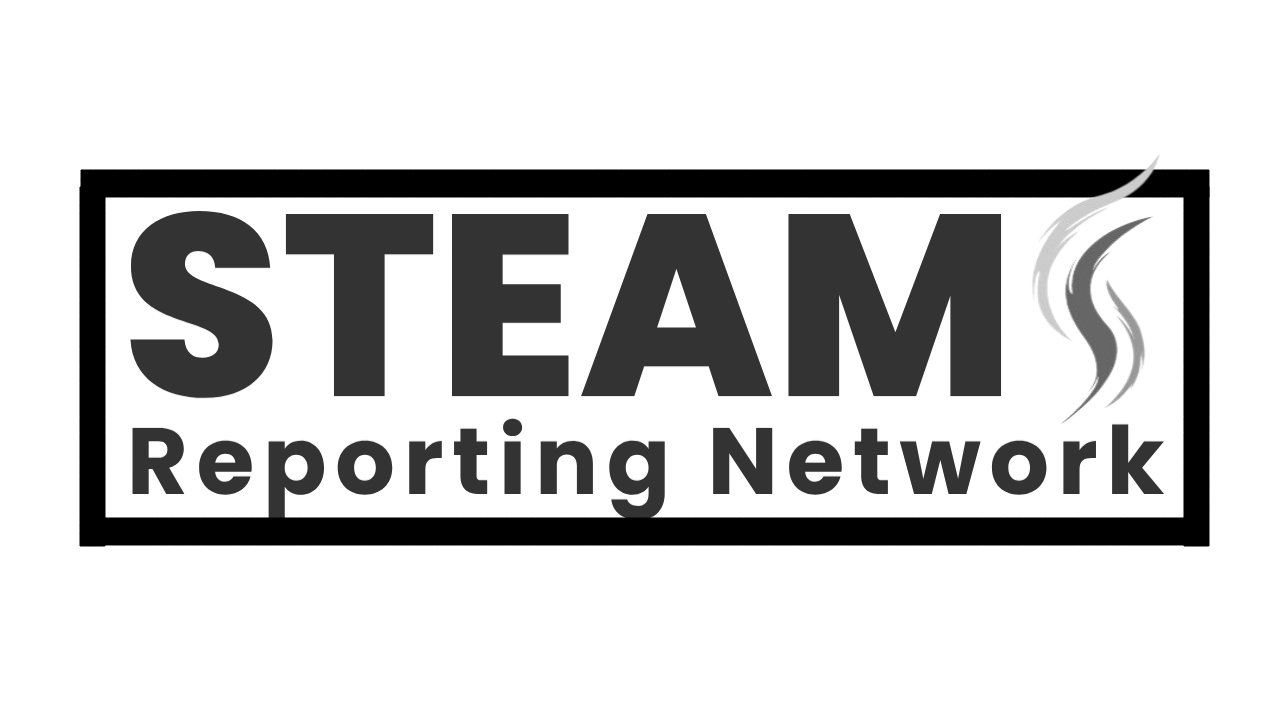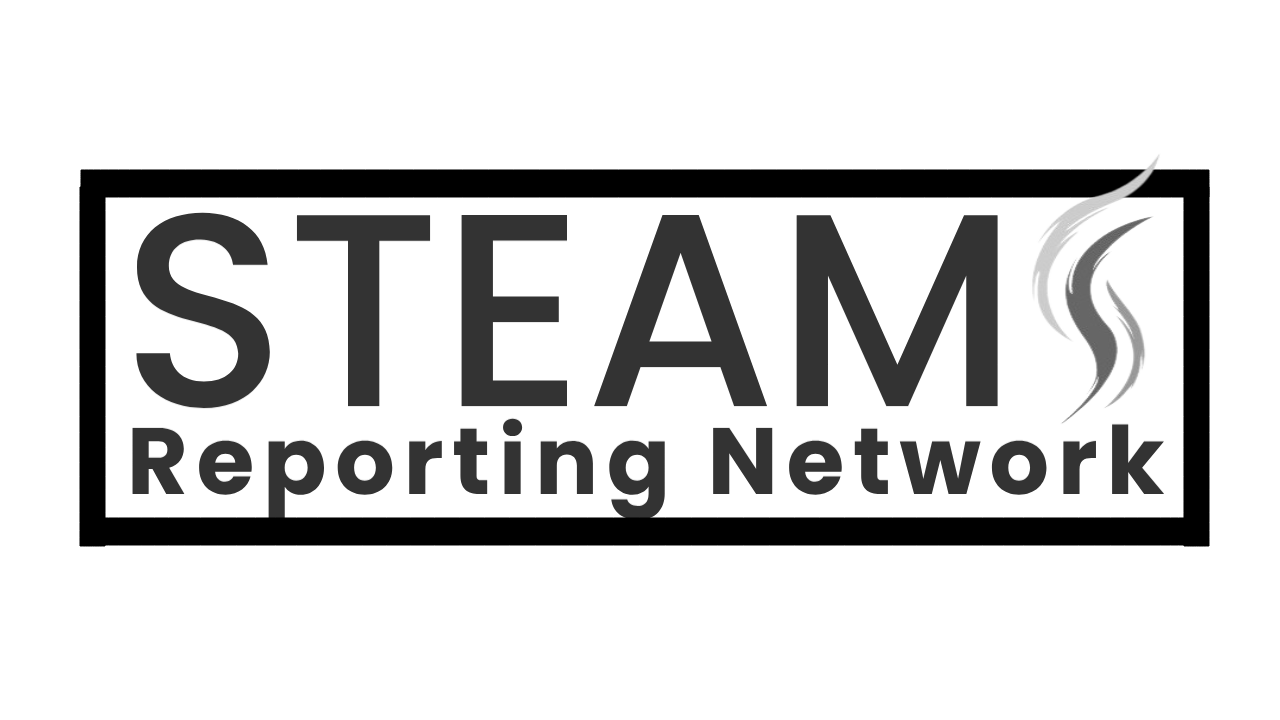
By Stephen V. Lansana
PHOTO: The Registrar of the Sierra Leone Nursing and Midwifery Council, Matron Christiana Massally
State Registered Nursing programme is one of the programmes that women in the Pure Sciences choice as a career path at tertiary level after their senior secondary school education. But many of them apply in institutions without doing a background check to ascertain whether the institutions have accreditation or not.
Every Nation College, a Christian college in Bo, Southern region of Sierra Leone is one of the colleges that offers State Registered Nurse (SRN) without an accreditation.
The Nursing and Midwifery Board which became a Sierra Leone Nursing and Midwifery Council in January 2023 is responsible for the monitoring of Nursing Training institutions, midwifery institutions, issuance of licenses, coordination of licentious examinations, accreditation of nursing schools, and prescription of dress code and ethics for nurses, etc.
It be recalled that Tertiary Education Commission (TEC) accredited Every Nation College with Category B status on 15 February 2022 to offer six undergraduate degrees such as B. Sc. Public Health, B. Sc. Agriculture, B. Sc. Computer Science, B. Sc. Theology, B.Sc. Business Administration and B. Sc. Accounting, but unfortunately, the said College is currently offering Higher Diploma in State Registered Nursing (SRN) without accreditation.
The Registrar of the Sierra Leone Nursing and Midwifery Council, Matron Christiana B. Massally told Premier News that they have 12 accredited institutions implement the SRN programme in Sierra Leone.
She said that there are only three institutions accredited to implement registered nursing in Western Area Urban: Faculty of Nursing in COHMAS offers SRN, B.Sc in Nursing and at some levels Midwifery, Bu Ali Sina Nursing at 58 Wilkinson road offers SRN, and department of Nursing at the AMTA Medical College situated at PWD.
“We have visited Western Area Rural, but we have not given accreditation to any school to offer nursing programme,” she said. “The professional nursing programmes start with SRN and then B.Sc. which are offered in the Urban but not in the Rural. No school in Western rural district is accredited to implement any type of nursing programme in Sierra Leone.”
She disclosed that they had been training auxiliary nurses in Maternal Child Health Assistant (MCHA), but that has been put on hold, disclosing that there was only one school in the Western Area Rural offering the MCHA but that programme has been put on hold.
“As long as nursing training programmes are concerned, we only have implementations in the Western Area Urban,” she emphasized. “Any school [institution] that you see offering nursing programmes in the Western Area Rural District, that institution is cheating the country and it’s a serious crime.”
In the North and North-West, she said that they have three institutions offering SRN: PortLoko School of Nursing, the Saint John of God Nursing School Lunsar, and the Department of Nursing, University of Lunsar.
She added that the Department of Nursing at the University of Lunsar is only accredited to offer B.Sc. in Nursing and not SRN.
In Makeni, she stated that they have the department of at Ernest Bai Koroma University (EBKUST).
The Registrar said that have two schools in Tonkolili district that offer SRN. These are: Masanga school of Nursing in Tonkolili district, and Department of Nursing at the Central University at Mile 91.
She disclosed that they have offered EBKUST a partial accreditation to commence the B. Sc. in Nursing programme, noting that the partial accreditation means that they should commence the Bachelor’s programme whilst working on the fulfilment of the other requirements. “If we go to EBKUST and they have not fulfilled all the requirement for the accreditation for B. Sc. In Nursing, then the status of partial accreditation will be withdrawn,” she said.
She added that these are the only schools that are offering Nursing in the North.
She said that in the Southern region, there are only two institutions accredited to offer Nursing programmes: department of Nursing Njala University, and the School of Nursing in Mattru, Bonthe District.
She said that there is only one school in the Eastern province that offers SRN which is the department of Nursing, Eastern Technical University in Kenema. She disclosed that they have an hamonised curriculum for SRN.
Speaking on Midwifery, she said they only have three schools accredited to offer the programmes in the country, noting that these schools can now directly admit students from secondary school into the midwifery programmes.
These schools include the National School of Midwifery in Freetown at the Princess Christian Maternity Hospital situated at Fourah Bay Road, School of Midwifery Masuba in Makeni, and School of Midwifery Bo.
“I really want to stress on Bo district because we have heard that a Christian person is running a nursing programme in his school in Bo,” she emphasized. “We are expecting so much from religious people.”
“Every Nation is an unaccredited school. We don’t know about them,” she disclosed. “This is gross disrespect to the Council and the country as a whole because this Council has an Act of Parliament and the President as assented it.”
She said that nobody should start any Nursing programme without an accreditation. “I am so frustrated to hear that the owner of the college [Every Nation College] is a religious leader,” the Registrar said.
She disclosed that according to their Act, anybody that operates a nursing school or any establishment of school without the knowledge of the Council, that person should pay nothing less than Le 100million, adding that the maximum fine will even go up to billions.
She said that Nursing is the backbone of Ministry of Health and as such they should be trained in accredited schools.
She disclosed that they only have business with the 12 accredited schools and they don’t conduct Nursing Exam for any uncredited school because they do not know about their existence.
“We have a file for every accredited nursing school in the country which has details like the name of the proprietor, the enrollment, examinations conducted, and the number of passes, etc” she said pointing at the files in her office.
She pointed out that this Nurses Board was established in 1956, and the Board has always placed premium on monitoring of nursing schools since it establishment for public safety, noting that the ordinary person doesn’t know the school that you attends, but the mere facts that people see you in a nurse uniform, they will conclude that you are a nurse and they will come to you for treatment when they are sick not knowing that you are not a nurse thereby leading to a death of patients or clients.
She said that an unlicensed person is not a nurse, adding that those pursing nursing programmes in an unaccredited institutions will not be licensed because their institutions are running the programme illegally.
She called on proprietors to get their accreditations before commencing the nursing programmes, adding that they are always at the office and at times during holidays just to ensure that they attend to people when they come to their office.
She pointed out that people [Proprietors] will just open kitchen rooms and called it institutions and start collecting monies from innocent people for nursing programme.
She explained that despite their challenges with office space and mobility [they only have one old vehicle], they have hardworking staff [experts] who monitors nursing schools, stating that the need an office space and mobility to more effectively facilitate them to perform their duties.
She said that they always attend programmes or activities that the accredited schools implement.
When asked whether she was aware about the sales of application forms for Maternal Child Health Assistant [MCHA] in Pujehun, she answered in an affirmative.
She said that the reason for the sales of MCHA forms was that, they did an assessment and noticed that MCHAs are scares in most hard to reach communities because most of them have retired, some have died and some have upgraded themselves, adding that this is why the government in her wisdom has reintroduced it [MCHA] in six districts: Pujehun, Bonthe, Koinadugu, Kerena, Falaba, and Kailahun should train at least 50 MCHA are to be in their post because they lack them now.
“You see, Peripheral Health Units (PHUs) are the front-liners. They are the only people you find in a very remote area which mean that certain areas need MCHA,” she said. “You can’t find a doctor there. You will not find an SRN there. You will not find state enrolled midwife there. But you will find the MCHA there as a front-liner for that community and she will do her referral.”
She stated that the mandate of the SRN and midwifery are at the secondary healthcare [at the bed side] and one cannot find them in remote communities unless health sisters who go there to supervise or train but they can’t work there.
Speaking on the State Enrolled Community Health Nurse (SECHN), she said that in 2018, they did an assessment and the findings were not encouraging which made the Board members to take unanimous decision to put SECHN Training Programme on hold in all the 11 schools that were offering it in the country.
She disclosed that they [Council] encouraged Nurses with SECHN to enroll into the midwifery programme in Bo and the other place whilst some have basic specialties in Mental Health, Paediatic care [with support from UNICEF], adding that they have trained most of them in the midwifery course and government through the Global Funds helped 500 of them to pursue the SRN.
Speaking on the criteria, she said that when institutions want to train nurses, 60% should be practical and 40% should be in the classroom, adding the said institution should have a hospital with nothing less than 150 beds with senior nurses at the hospital with updated license to train those pursing the nursing course, qualified fulltime lecturers who are nurses, skills Lab and conducive lecture rooms.
She disclosed that they have their monitoring tools with 11 standards which contains everything that nursing is about and if a nursing school has less that 60%, that school will not be accredited.
She said that after the students have completed your course programme in an accredited institution, they do an internship programme for one year after which they are issued licenses.
“When accredited institutions complete their admissions, they will send the names of students who have been accepted to do SRN and we will do indexes, and the school will now continue with their training,” she said. “The said list [names submitted to us] will reduce but it won’t increase except a student has reference.”
She explained that when they give accreditation to institutions, they will also provide them the curriculum for the said programme, noting that they don’t give curriculum to schools that are unaccredited.
Roland B.C Jones, the Public Relations of Tertiary Education Commission (TEC) explained that according to before individual [proprietor] operates any pro secondary education, s/he should write a letter of intent to the Commission specifying the type of courses which they intend to offer and TEC will acknowledged it and then invite him or her to the Commission, adding that they will explain the three categories [category A, B and C] of accreditation to the applicant.
He explained that category A institutions are those that offer degrees on their own, category B are those that offer degrees through affiliations and Category C offers certificates and diplomas only. He disclosed that they have a team of experts for the various Categories who visit the location of the institutions, interview the lecturers and evaluate them, and based on the evaluation, TEC will now write to the Ministry of Technical and Higher Education that this institution is fit for a particular category.
He said if an institution is not fit based on the evaluation, they will write to them and tell them to wait for a period of two to improve their facilities and then reapply.
He added that irrespective of the Category, proprietors who intend to open colleges or universities should submit their curriculum, and lecturers’ qualifications.
Speaking on Every Nation College in Bo, he said that they [Every Nation College] might have a Memorandum of Understanding with the affiliated university [Ernest Bai Koroma University (EBKUST)] for them to offer those courses, adding that the affiliated college will supervise all their degree programmes because they have an accreditation for Category B with specific courses accredited to them.
“Before an institution with Category B accreditation run a degree programme, it must have an affiliation if not it is a serious crime,” he said.
He said that they don’t want to disadvantage students because over the years many students have been disadvantaged, students from Dominion University, Global Professional University, and also African Graduate University, pointing out that they don’t want to see such happen again because it is heartbroken.
“It is a crime for an institution with Category B accreditation to offer courses that are not specified in their licence without the knowledge of TEC,” he said. You can go to jail. The Proprietor and the registrar can go to jail.”
He recommended that students who wished to pursue a certain course in a particular institution should check at the TEC website or visit their office to find out if the said institution has an accreditation or not.
“Students should not only do a background on the institutions, but they should also check for the programme they want to pursue,” he emphasized. “For instance, there are high demand for nursing programme. If you want to do a Nursing Programme, it is fine for you to come to us because we will definitely look at their files to see if they are accredited.”
He added that for an institution to receive an accreditation for Nursing, TEC and the Nursing and Midwifery Council will do a background check and it is based on the recommendation of Council that TEC will give an accreditation.
He said that their experts will also go and check whether the said institution has a laboratory, Library, Hospital where nurses can practice. “If the Nursing Board is not satisfy, TEC will not give accreditation,” he said.
He encouraged educational institutions to offer programmes that are accredited to them.
The Chief Executive of Campaign for Human Rights and Development International (CHRDI), Abdul M. Fatorma said, “As a right-based organisation, we are concern about such float of the law and we expect educational institutions to be compliance to national laws and regulations that guides and governs their operations.”
He said that it is a worried situation when once educational institution go outside the laws of the land because they will not be actually able to impact the knowledge that society expect from them because if they are teaching students about lawlessness, when they go out there, that is what they will practice.
“The government should prosecute any institution that offers courses illegally and confiscate there current status of operations,” he said, adding that the government should also ban the institutions so that it will serve as a strong warning for other institutions.
“It is unacceptable both morally and socially to offer courses that are unaccredited,” the Chief Executive emphasized. “It is really sad to have some group of people in our communities who think that they are above the laws of our country.”
He called on parents, guidance and students to check the status of the institutions before applying, noting that there are a lot of institutions who posed to be a credible institutions but in actual fact they are not.
He added that an unaccredited programme is illegal, fake and no future employer will recognize such academic certificate. “That is the reason why the State needs to protect the citizens from the fraud institutions.”
He urged the Government to investigate these institution. He also urged that “those institutions should refund all monies that their current students have paid.”
He said that fake degrees or programmes undermine the growth and development of every nation and fake degrees undermine the confidents between people and institutions. “It is when people start scaring that most of our nurses have fake qualifications, they cannot go to those hospitals,” he added. “It is catastrophic. It is actually bring a lot of problems into society.”
He pointed out that fake degrees undermine the confidence, trust and the development of our communities.
He called on the Parliamentary Oversight Committee on Tertiary and Higher Education to actually look into the issue of institutions offering unaccredited courses like nursing and make recommendation.
He called on the Executive branch of government to look into the previous parliamentary report on fake degrees and address it.
This medium contacted the Registrar of Every Nation College, Mr. Momoh Albert Lissa but he refused on comment.
Our investigation shows that this College [Every Nation College] commenced programmes without any accreditation and in 2015/16 academic year, an attempt was made by the government to closed the college for offering courses include Degree programmes without any accreditation from the TEC.
Also, most graduates from this college were denied employment opportunity because the courses they pursued were illegal. It was only in 2022 that Every Nation College was accredited to offer degree programmes.
Effort to interview the Parliamentary Oversight Committee on Tertiary and Higher Education prove futile.


Photo: A Category B accreditation issued to Every Nation College to commence degree programme


Photo: A provisional offer of admission to pursue a programme of study leading to the award of SRN effective 2023/2024 academic year which begins on Saturday 7th October, 2023

